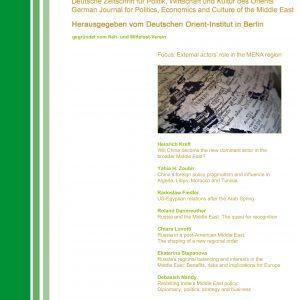Description
Long considered peripherical and relatively insignificant by China´s leadership the Broader Middle East and particularly the Gulf States have moved into the focus of China´s foreign, foreign economic and security policy. China´s dependence on the region for oil supply has multiplied due to its economic boom. The safety of the shipping routes across the Arab and the Red Seas and the Suez Canal to Europe have become a Chinese concern too and the influence of Islamic fundamentalism from the region on its own Muslims. While China´s interest in the region has grown, the region is no longer a top priority for the US, since it has become self-sufficient in energy. The US has also reduced its military presence in the region. This leads to the impression that China could replace the US in the medium and longer term. This could indeed be the result, if the US is further retrenching form the region, but there are no signs that China intends to replace or even to push the US out of the region. With frequent top-level visits to key partners China pursues a friends-to-all approach to the region which it tries to integrate more and more in its Belt and Road Initiative and the Shanghai Cooperation Association. It remains open if Beijing can continue with this approach and avoid getting entangled in the conflicts of the region.
Heinrich Kreft is a German career diplomat and academic. Since September 2020 he is the Director of the Center for Diplomacy at Andrássy University in Budapest, Hungary, where he also holds the Chair for Diplomacy. From 2016–2020 he was Ambassador to the Grand Duchy of Luxembourg and before that Deputy Chief of Mission of the German Embassy in Madrid. Prior to this he was Ambassador and Director General for International Academic and Educational Relations and Dialogue among Civilizations in the German Foreign Ministry (2011-2014). In this capacity he set up various dialogue projects among others with parliamentarians and politicians from various Arab countries, Germany, France and the UK. Prior to this he served as Senior Foreign and Security Policy Advisor in the German Parliament (2006-2010). As diplomat he was stationed in La Paz (1988-91), in Tokyo (1991-94) and Washington D.C. (2001-04). In the Foreign Ministry he was a member of the Policy Planning Staff (in charge of the Americas, Asia and Economic Issues 1996-2001) and later Senior Strategic Analyst and Deputy Head of Policy Planning Staff (2004-06); He was visiting fellow at The Henry L Stimson Center (July-Dec. 2001), the Heritage Foundation (Jan. – March 2002) and the Woodrow Wilson International Center (April – June 2002) in Washington, D.C.; He has published extensively on major power political and economic relations; on international security; the Arab World; European, American and Asian political and economic affairs. Most recent publications on US-China relations; transatlantic relations; Islam in Germany; geopolitics and culture and on German and European foreign policy. He is a member of the German Council on Foreign Relations and of the Board of Trustees of the German Oriental Institute and The Sheikh Group. Heinrich Kreft has studied in the US, in Paris (“Science Po”) and holds a Master’s Degree and a Ph.D. in Political Science, History and Sociology from WWU Münster in Germany. He did field research in Ecuador and as a member of the German Development Institute (GDI) in Mali (Timbouctu region).




Reviews
There are no reviews yet.